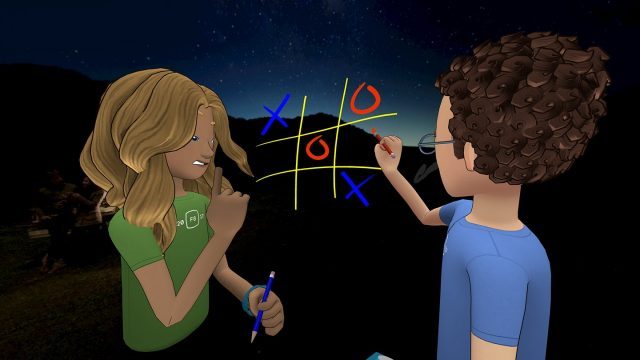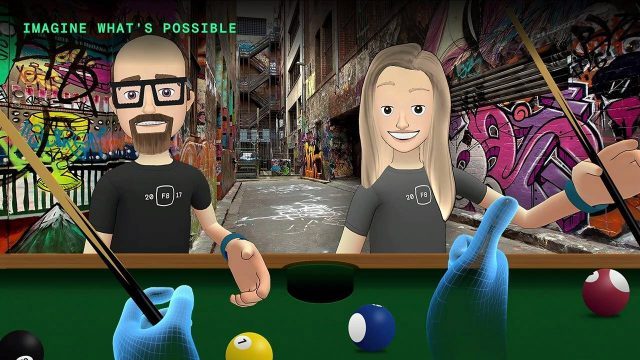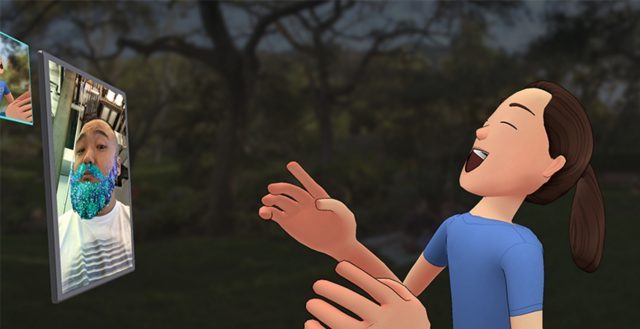Facebook launched their first social VR app Spaces last month to much acclaim. It’s a polished experience that does a few things very well, and has the major benefit of tapping into Facebook’s existing dominance of the social graph. But to become truly compelling it needs to do much more than it does today. Facebook knows this, and is looking to third-party developers to expand and enhance Spaces.
Spaces, available today as a beta on the Oculus Rift (and playable on Vive with a hack), demonstrates a few key concepts of socializing in VR:
- Social VR doesn’t necessarily require virtual exploration of a virtual environment. Many other social VR apps place users in a world space and ask them to move about. Spaces puts users around the central fixture of a table, and doesn’t allow them to move around, putting the emphasis on what they are doing together, not where they are doing it within the virtual space.
- Social VR isn’t only about doing, it’s also about sharing. Many of today’s social VR apps try to give users something to do inside the social space. This is useful to connect strangers who can use the activity as their common ground when there otherwise isn’t any. When it comes to socializing in VR with real life friends, you want to be able to share important moments in your life, not just participate in a shared activity. Facebook has a huge leg up here because their platform already serves as a host for much of the content people want to share with friends, in the form of photos and videos (and more recently, photospheres and videospheres). Few other social VR apps today make it easy to media from your real life with friends in VR.
- Social VR isn’t only about VR. That sounds weird, I know… but for VR to be social, it needs to be inclusive; if it’s limited to only people with VR headsets, then today that cuts out the vast majority of the world. Spaces allows users to make Messenger video calls from inside VR to the outside world. This not only lets users connect with friends who don’t have VR equipment, but it also lets those non-VR people literally see into the virtual world through their smartphone, opening the door to a massively larger group of people who can participate in social VR.
And while Spaces aptly demonstrates these concepts, once you’ve made a few video calls to friends, drawn a few objects with the virtual pencil, and shot a few virtual selfies, you may find yourself with a lack of things to do beyond talking and sharing pictures. But Spaces isn’t meant to be a finished product at this stage—hence the beta tag—and like many Facebook products, the company wants to open the door to let third-party developers expand spaces to let users do new and interesting things.
Much like Messenger, the company’s chat app, Spaces is meant as a foundation that does a couple of core things right, and then lets developers build on top. Today Messenger offers a text communication channel at its core, but from there you can find many third-party applets the integrate directly into the chat stream, specifically those which allow sharing of additional content types like music, gifs, locations, and even mini-games.

At F8, the same conference where Facebook announced Spaces, they also announced that they’re opening the camera in their apps to do the same—allow developers to start building augmented reality extensions on top.
Spaces will follow a similar path. Facebook knows that it alone won’t be able to sufficiently build out every feature or activity that people will want, nor will get be able to integrate all the services that provide sharing of different content types that people will want to bring into VR. Instead, it makes a lot more sense to open the door to let developers build on Spaces and make these integrations when and where users will find value from them.
It’s too early for Facebook to just throw an API out there and let developers have at it. VR is so new that it’s still not clear exactly how such extensibility should even be structured (though there’s probably lessons to be learned from apps like Second Life). But the company says it wants to being working with developers to start to answer that question and more.
Speaking at F8, Facebook Social VR Product Manager Mike Booth explored the making of Facebook Spaces, and toward the tail end of his presentation he spoke about the direction the company plans to take the app in the future (you can watch this section in the video heading this article).

“We’re putting [Spaces] out because there’s some interesting things to do, but we have lots of things we want to do in the future. One of the things that we’re thinking about is what Mark [Zuckerberg] talked about at [Oculus’ most recent developer conference] which is this people-centric computing platform,” Booth said. “So in this case say I want to hang out with Rachel. So we meet up in VR and we’re there in the space. And then we decide ‘hey let’s play pool’, so instead of launching into a separate app, we have a way to bring a pool table into the space with us. […] So we’re playing pool… now we want to listen to music. Let’s bring in a boom-box that can stream my favorite music service. So this is the kind of thing we want to do where these things come into the space, and they combine together. So we’re very interested in working with developers and talking to developers about the future of this sort of thing.”

That’s the plan, though Booth readily admits that the company is still figuring out exactly how this should work.
“We have no way to do this right now, but we are very interested in figuring out a way for third-party developers to be able to create interesting experiences and objects that we can bring into spaces to use together.”
With Spaces, Facebook is following their philosophy of “move fast and break stuff,” and hopes to learn from its users where they should focus their attention on continued development.
“I know you’ve probably heard this a million times today—but this is very literally true with Facebook Spaces right now, that’s why we’re labeling it as a beta—’this journey is 1% finished’. We have some really fun interactions, we have a million more things that we have planned… we wanted to put this out so people could use it and we could see what they do with it and we could get feedback from people on where to go next.”






